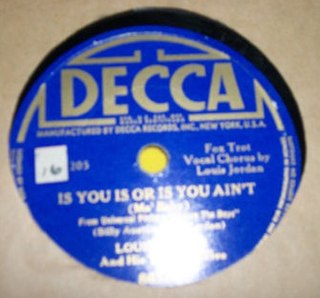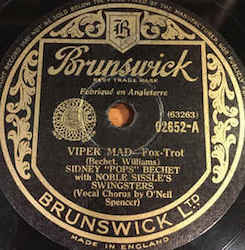
Harry "The Hipster" Gibson, born Harry Raab, was an American jazz pianist, singer, and songwriter. He played New York style stride piano and boogie woogie while singing in a wild, unrestrained style. His music career began in the late 1920s, when, under his real name, he played stride piano in Dixieland jazz bands in Harlem. He continued to perform there throughout the 1930s, adding the barrelhouse boogie of the time to his repertoire.

Stoner film is a subgenre of comedy film that revolves around the recreational use of cannabis. Generally, cannabis use is one of the main themes and inspires much of the plot. They are often representative of cannabis culture.
The swing revival, also called retro swing and neo-swing, was a renewed interest in swing music, beginning around 1989 and reaching a peak from the early/mid to late 1990s. The music was generally rooted in the big bands of the swing era of the 1930s and 1940s, but it was also greatly influenced by rockabilly, boogie-woogie, the jump blues of artists such as Louis Prima, and the theatrics of Cab Calloway. Many neo-swing bands practiced contemporary fusions of swing, jazz, and jump blues with rock, punk rock, ska, and ska punk music or had roots in punk, ska, ska punk, and alternative rock music.

"Why Don't You Do Right?" is an American blues and jazz-influenced pop song usually credited to Kansas Joe McCoy. A minor key twelve-bar blues with a few chord substitutions, it is considered a classic "woman's blues" song and has become a standard. Singer Lil Green recorded a popular rendition in 1941, which Peggy Lee recorded the next year — accompanied by Benny Goodman — and made one of her signature songs.

Charles Plymell is a poet, novelist, and small press publisher. Plymell has been published widely, collaborated with, and published many poets, writers, and artists, including principals of the Beat Generation.
The Harlem Hamfats was a Chicago jazz band formed in 1936. Initially, they mainly provided backup music for jazz and blues singers, such as Johnny Temple, Rosetta Howard, and Frankie Jaxon, for Decca Records. Their first record, "Oh! Red", became a hit, securing them a Decca contract for fifty titles, and they launched a successful recording career performing danceable music.

A roach is the remains of a joint, blunt or roll up cigarette after most of it has been smoked. Most roaches are disposed of immediately after smoking a joint; however, some users will retain the roach for use at a later date. Some users maintain that smoking the roach again has a more intense high due to a high concentration of resin that gathers at the tip of the filter.

"Is You Is or Is You Ain't My Baby" is a song written by Louis Jordan and Billy Austin. The song's first recording, by Jordan, was made on October 4, 1943. It was released as the B-side of a single with "G.I. Jive" with the title "Is You Is or Is You Ain't ". The song reached No. 1 on the US folk/country charts, number two for three weeks on the pop chart, and number three on the R&B chart.

Cannabis culture describes a social atmosphere or series of associated social behaviors that depends heavily upon cannabis consumption, particularly as an entheogen, recreational drug and medicine.

"If You're a Viper" is a jazz song composed by Stuff Smith. It was first recorded by Smith and his Onyx Club Boys in 1936 and released as the b-side to the song "After You've Gone".
Jive talk, Harlem jive or simply Jive is an African-American Vernacular English slang or vocabulary that developed in Harlem, where "jive" (jazz) was played and was adopted more widely in African-American society, peaking in the 1940s.
Louis Jordan was an American popular music innovator who recorded from the 1930s until the 1970s. During the 1940s, he was the most popular recording artist of the soon-to-be-called rhythm and blues music. Jordan had eighteen No. 1 hits, which places him as the third most successful singles artist in Billboard R&B charts history. His 1946 recording of "Choo Choo Ch'Boogie" is tied for second place for spending the most weeks (eighteen) at No. 1. Jordan's success was not limited to the R&B market — he also had No. 1 hits on the Billboard Pop and Country charts.
Stash Records was an American independent jazz record label based in New York City that flourished from 1975 through the late 1990s. Its name was drawn from the subject of its first album, Reefer Songs (1976). Bernie Brightman (né Bernard Benjamin Brightman; 1921–2003) founded the label in 1975, structured it as a New York entity May 4, 1977 – Stash Records, Inc. – and operated it about until 1998. The corporation dissolved March 28, 2001.
"Have You Ever Met That Funny Reefer Man", often known simply as "The Reefer Man", is a 1932 American jazz song composed by J. Russel Robinson, with lyrics by Andy Razaf. It was first recorded by Cab Calloway and his orchestra, with versions by others over the years, including by Harlan Lattimore, Murphy's Law and Big Bad Voodoo Daddy.

Terms related to cannabis include:

"Viper Mad" is a composition by Sidney Bechet and Rousseau Simmons; it is also known as "Pleasure Mad".
Here Comes the Man with the Jive is a drug-themed jazz song. It was and composed by Leroy "Stuff" Smith and Jack Palmer.









